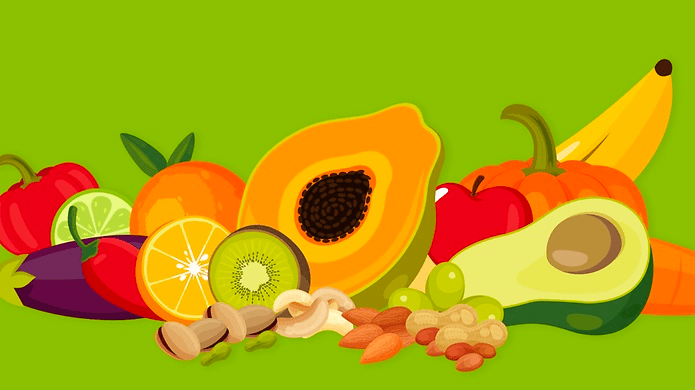Pollen Food Syndrome: The condition that affects 1 in 50 but few know about
A OnePulse survey* of 500 UK adults conducted by LloydsPharmacy Online Doctor revealed:
- Although 57% of respondents said they suffer from hay fever, 78% hadn’t heard of pollen food syndrome.
- Just 5% said they would feel ‘very confident’ explaining the foods that trigger pollen food syndrome.
*Survey conducted 02/03/2023. Full survey results here.
As we hit hay fever season, GP at LloydsPharmacy Online Doctor, Dr Sabah Salman (GMC 6148967) explains what the condition is, the main trigger foods and what to do if you think you might have pollen food syndrome.
This image is free for editorial use and third-party distribution. Dr Salman and LloydsPharmacy Online Doctor welcome you to include this image in your coverage, with no attribution needed.
What is pollen food syndrome?
“Also referred to as oral allergy syndrome, pollen food syndrome (PFS) is a hypersensitivity reaction to plant based foods like fruits, vegetables and nuts. When people with this condition eat these foods in their raw form, it can cause mild irritant symptoms including itching of the mouth, lips and throat.”
How common is pollen food syndrome?
“Pollen food syndrome affects around 1 in 50 adults in the UK. Often, it occurs in people who get spring or summertime hay fever, although this is not always the case.”
What causes pollen food syndrome?
“Many plant based foods, such as fruit and cereals, have a protein structure that is very similar in shape to the pollen in the sorts of trees, grasses and weeds that cause hay fever. Your immune system doesn’t always recognise the difference between the pollen you breathe in from things like trees, and the pollen structure in the plant based foods you eat.
“Essentially, pollen food syndrome results when the immune system recognises the food protein you eat as an allergen and creates an allergic reaction, resulting in similar symptoms to hay fever.”
Which foods cause pollen food syndrome?
“Fresh fruit, raw vegetables and raw nuts are the kinds of foods that trigger pollen food syndrome. Although almost any fruit, vegetable or nut can cause a reaction, in particular, raw apples, fresh peaches, kiwi, hazelnuts and almonds are common triggers. On average, those with pollen fruit syndrome will need to avoid four plant foods.”
Common pollen food syndrome trigger foods
This image is free for editorial use and third-party distribution. LloydsPharmacy Online Doctor welcome you to include this image in your coverage, with no attribution needed.
What are the symptoms of pollen food syndrome?
“Symptoms are usually mild and tend to occur within 10 minutes of eating the allergic food. These symptoms can include redness, itching and mild swelling of the lips, tongue, inside of the mouth, ears and throat.
“Some people notice symptoms just from food preparation. For example, food particles in the air can trigger sneezing, a runny nose and eye irritation, and peeling fruit and vegetables may cause skin irritation.
“Although rare, more extreme symptoms like nausea, vomiting, trouble swallowing, and breathing difficulties can occur. Of course, in this case you should always seek urgent medical treatment.”
What should I do if I have a reaction?
“Generally, mild pollen food syndrome symptoms settle within an hour, without treatment. All you will need to do is stop eating the food, and drink some water to stop the symptoms. However, if you’re concerned or your symptoms are unpleasant, you could also take a non-sedating antihistamine.
“If you have taken an antihistamine but your symptoms are not improving, you should seek medical advice. If you have a food allergic reaction which affects your breathing or circulation, for example, causing faintness, do not rely on antihistamines or an asthma inhaler. Instead, speak to a medical provider urgently.”
How can I prevent reactions?
“Reactions can be prevented by avoiding allergenic food in its raw form or other triggers. Once well cooked or tinned, the allergens will have been denatured and should not cause an issue. This means a soup containing allergic food may not cause symptoms but a stir-fried vegetable – which has been very gently cooked – may be an issue.
“Some people also find that they can tolerate certain varieties of the same food. For example, one variety of apple may cause reactions, whereas another may not.
“If food preparation triggers your symptoms, wearing gloves or peeling allergic foods under running water can be an effective workaround.
“If you do have to cut certain triggering plant foods out of your diet, ensure you replace these with other, tolerated foods. You still need to aim to eat at least five different portions of fruit and vegetables a day to ensure your diet remains high in fibre, vitamins and minerals.
“If you have been prescribed allergy treatment for other allergies, such as asthma and hay fever, you must keep taking these as this will help to control symptoms of pollen food syndrome. If you’ve experienced a severe reaction in the past, such as anaphylaxis or breathing difficulties, you may also be prescribed an adrenaline pen.
“Anaphylaxis can cause swelling of the lips and tongue, breathing problems, collapse, and loss of consciousness. In some cases, anaphylaxis causes death, meaning it must always be treated as a medical emergency.”
How is pollen food syndrome diagnosed?
“If you experience symptoms of pollen food syndrome, you should book a doctor’s appointment. Often, pollen food syndrome can be diagnosed without further testing. However, you may be referred to have a blood test or skin prick testing to confirm a diagnosis.”
Credit to https://onlinedoctor.lloydspharmacy.com/uk/allergy who supplied the above post.
Help keep news FREE for our readers
Supporting your local community newspaper/online news outlet is crucial now more than ever. If you believe in independent journalism, then consider making a valuable contribution by making a one-time or monthly donation. We operate in rural areas where providing unbiased news can be challenging. Read More About Supporting The West Wales Chronicle

























